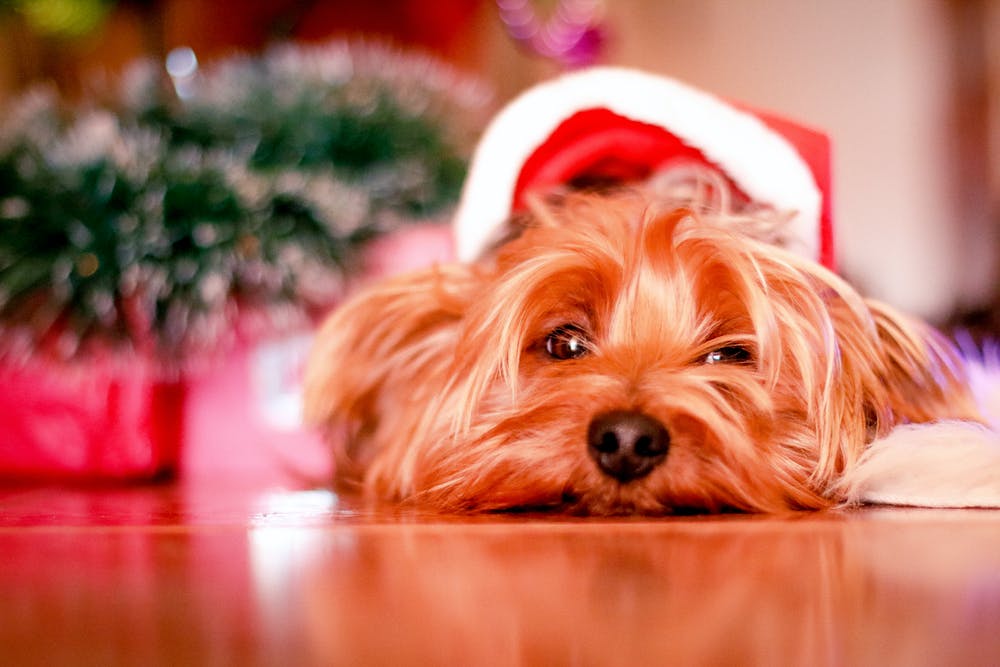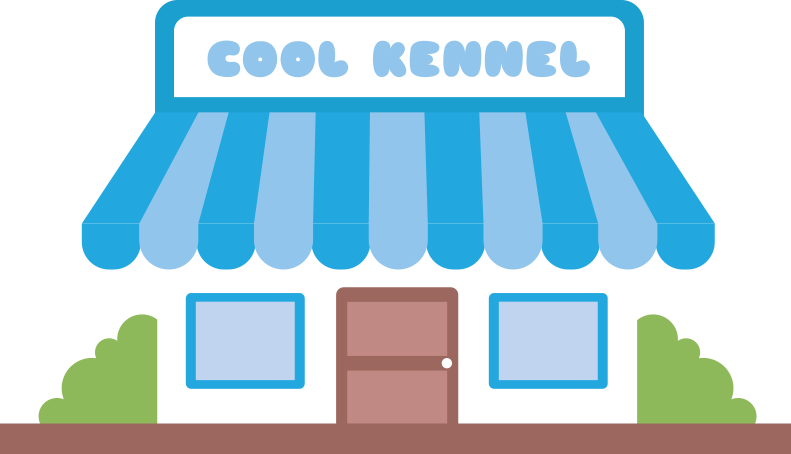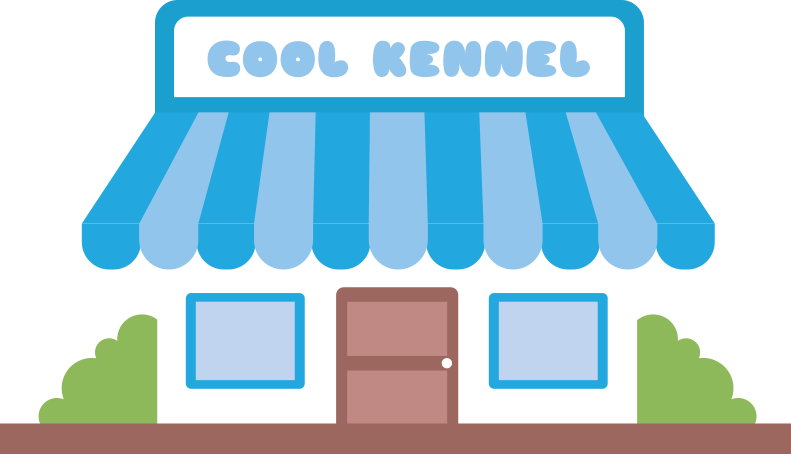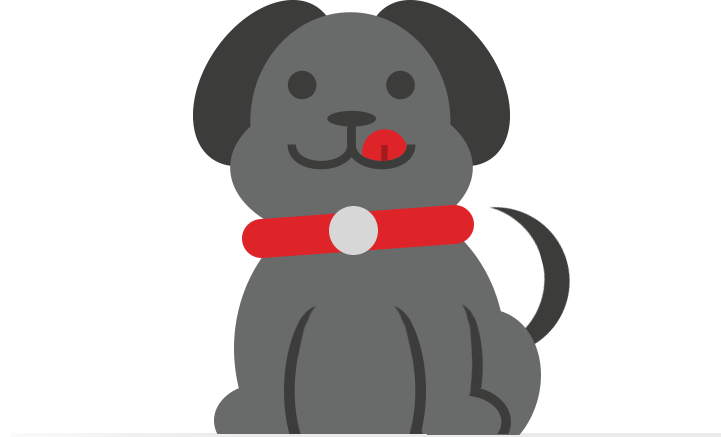How can I keep my Dog calm at Christmas?
Back
As dog owners we know that each and every dog has their own personality and characteristics, this is one of the many things that we know and love about them. There is one common factor that you will notice in that many dogs are very sensitive to change. The level at which your dog is able to cope with change is partially dependent upon their experiences in life so far, particularly as a young puppy- this can affect how they cope with new people and places in the future and has shaped their personality already. One of the biggest things about change that dog's can be sensitive to is changes to their routine. Christmas is the time of year when that routine is most likely to be upset or changed- sometimes for a few hours, sometimes for a few weeks, and this can lead to some errativc behaviour from your dog, caused by the stress and excitement of the festive season.
What are the key stressors for dogs at Christmas time?
-
Changes in routine. When you think about it this makes perfect sense, our dogs are completely beholden to their owners to provide the things that they need, which is why they can become stressed and anxious if they don't know when the next meal, walk or nap will be. This is why structure is so important to dogs so trying to keep as much to a routine as possible will help to keep your dog's stress levels to a minimum.
-
morning and bedtime routines- we are all guilty of burning the candle at both ends, especially at busier times of year. If you know that you are going to be later to bed make sure that there is a quiet and comfortable area nearby so that your dog can still go to sleep when they want to. If you are planning to get up later we would suggest putting your dog to bed later too, making sure that they have an opportunity to go to the toilet just before bed, and as soon as they wake up as normal. How long your dog is happy to be left to sleep at night will be personal to them and you should aim not to leave them for many more hours than usual as this is likely to be very stressful for them. Try to keep their bed in the same place as normal where possible and try to keep activity away from that space.
-
Walking- Following your normal walking routine can be difficult, particularly if you are entertaining. Plan ahead and think about when is a good time to walk your dog so that you both get a bit of time and space together, and your dog will be more content once they have been exercised. You might be able to do this with a couple of shorter walks during the day or a longer walk in the morning (whilst the turkey is in the oven) or after lunch. If you really cannot walk, playing with your dog can be a good alternative to allow them to let off some steam.
-
Playtime- dogs often absorb and reflect our emotions, which is why they are likely to be a bit excitable at Christmas time. If they are a puppy the new experiences will be exciting and a bit overwhelming, and if they are an older dog the Christmas festivities and traditions will get them revved up for what is going to happen. This might lead to them being more playful, barking and jumping up but might also make them a little grumpy if they crave their own space and are feeling tired. If they have trouble calming down it is a good idea to try to get them to sit and to take them to a quieter area where they can calm themselves down. If this does not work try to distract them with a chew toy and change the mood by giving them lots of cuddles before getting them to sit and calm down. Try to avoid shutting them away as this might raise their anxiety levels but give them the option of a quieter space that is warm and comfortable where they can have some quiet alone time when they need it. Avoid punishing your dog as this is more likely to confuse them and lead to nervous behaviour in the future.
-
-
Rich and different food- it is so tempting to treat your dog, particularly on Christmas day when there is so much yummy food around and they are begging for a taste. However, it is important to remember that giving them lots of rich human food can give them a bad tummy which can lead to wind, pain and diarrhoea- feeling unwell will also make them feel stressed, tired and more irritable in coming days. We would recommend limiting the treats and food that your dog has to keep within the normal amounts they would have and within recommended dietary limits for the age, breed and size of your dog. We would also recommend if you must treat them, keep it to a minimum and give them things that are less likely to upset their tummy- such as a small amount of turkey with vegetables. Remember that human gravy contains a lot of sodium so resist the urge to pile this on too. If you want to treat your dog in a more dog-safe way many companies make dog friendly versions of roast dinner and Christmas treats, you may want to try some of these examples below.
 |
Barking Heads Wet Dog Food- Christmas Variety Pack (3 x 300g pouches) £5.81 1 x Top Dog Turkey, 1 x Pooched Salmon, 1 x Beef Waggington. All food is natural and grain free with no artificial flavours |
 |
Forthglade Christmas Wet Dog Food (7 x 395g) £16.96 Turkey, Cranberry and Parsnip. Natural and grain free complete wet dog food. |
 |
Lily's Kitchen Christmas Three Bird Feast for Dogs (400g) £5.75 Made with freshly prepared turkey, duck and goose with a supporting cast of festive parsnips and cranberries. |
 |
Pigs in Blankets Dog Treats (80g) £4.99 |
 |
Lily's Kitchen Christmas Spectacular Festive Cracker Dog Treat (100g) £4.46 Contains oven baked treats with turkey, cranberries, thyme and cinnamon |
 |
Doggy Mince Pies (pack of 2) £3.95 |
 |
Chocolate Orange Minis for Dogs (110g) £3.76 |
 |
Turkey and Cranberry Flavour Giant Dog Bone £9.08 |
-
lots of visitors and visiting- your dog's ability to cope with lots of people popping in and out will depend very much on their past experiences and their personality. If you have a particularly nervous or anxious dog, the most sensible thing to do is to make sure your visitors aware that you have a dog. Do not force your dog to meet people but let them meet people at their own pace. Remember that you will need to set the tone and if you are calm then your dog should remain calm, but it might be worth advising your visitors of any particular concerns that you have so that they know not to be too excitable around your dog and to give them space. Again, ensure that a separate, quiet space is available for your dog to retreat too if they are overwhelmed. If you need to keep them in a separate room try to do this using a baby gate or pen so that they can still see you and do not feel like they are being punished.
-
loud noises- many pets are sensitive to loud noises and Christmas is a time when they are more likely to come into contact with some of their triggers such as fireworks, Christmas crackers, music and people. If your dog is sensitive to noises you should read our article on how to desensitise your dog to loud noises and start to work with them on it well in advance so that they can progress at their own pace.
-
different places- if you are spending Christmas away from home it is a good idea to bring along things which smell familiar to them, like their bed, favourite toys and chews as this will help to make them feel more secure and will keep them entertained. Where possible try to stick to their routines and ensure that they have a quiet, comfortable space available to retreat to if they feel stressed.
Remember that anxious dogs may be more likely to demonstrate anxious behaviour, this might include chewing, barking, toileting indoors and being overly excitable. Never punish your dog for this behaviour as it will only make it worse as they will not know how to deal with their emotions which will create more worry and anxiety for them.
What can I do to keep my dog calm at Christmas?
The best thing that you can do is to plan and prepare by following the advice above, you should also be aware of the signs of stress and anxiety in dogs so that you can take action to comfort and reassure your dog and avoid their symptoms becoming worse over time.
What are the symptoms of stress or anxiety in dogs?
Many of the symptoms of stress could be viewed as "bad" behaviour, but are really a symptom of stress, it is important that you never punish your dog, this will be confusing for them and is likely to result in exacerbating the behaviours and making their stress worse.
Symptoms of anxiety, stress or fear in dogs can include the following:
-
aggression
-
toileting in the house
-
excessive drooling
-
destructive behaviour
-
depression
-
excessive barking or howling
-
pacing
-
restlessness
-
repetitive or compulsive behaviours
You may also be interested in our other articles about calming your dog, both with and without medication. If your dog's symptoms persist you should always seek professional advice.
See also:
How can I reduce my dog's anxiety?
Are there ways of calming my dog without medication?
Best Christmas Gifts for Dogs 2020
Similar Articles

Good Dogs. Good Kennels.
The Good Kennel Guide takes the stress out of dog boarding by only listing licensed kennels and boarders who meet the standards required by the Animal Licensing (Licensing of Activities Involving Animals) Regulations 2018.
All kennels and boarders that hold a valid licence have a free listing on the website which kennel owners and boarders can “claim” by creating a free account - this allows them to personalise some of their listing and interact with dog owners.

An easy-to-use system for dog owners
The Good Kennel Guide takes the stress out of dog boarding by only listing licensed kennels and boarders who meet the standards required by the Animal Boarding Act 1963.
Dog owners can sign up and create a profile here - it's really simple, and only takes a few moments.
Add your dog to your private profile to submit enquiries to kennel owners and boarders, send messages, and leave reviews following boarding.
Kennel Locations
England
Airports

